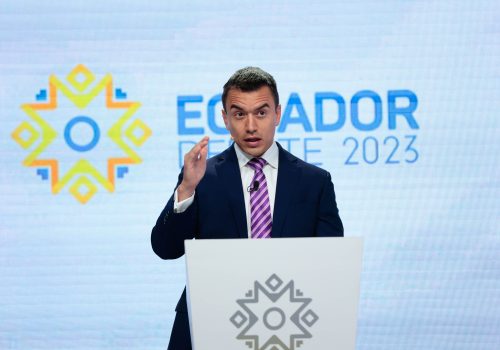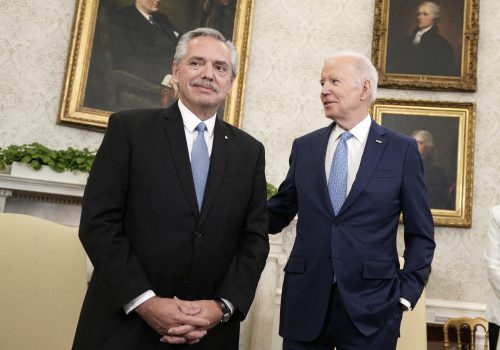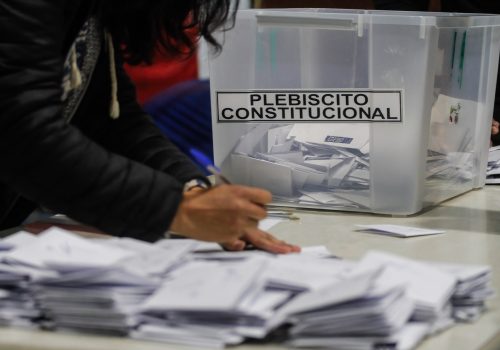Populism vs. the establishment: What to expect in Argentina’s presidential runoff
It was a Massa-ive surprise. In Sunday’s first round of the Argentine presidential election, Economy Minister Sergio Massa came in first place over right-wing populist Javier Milei, who had led in the polls. The runoff on November 19 will now pit Massa, an established politician who has promised to form a unity government, against the libertarian Milei, who has called for far-reaching change to prop up an Argentine economy in free fall.
Below, experts share their insights on why Massa won the first round and what to expect in the second round.
Click to jump to an expert analysis:
Jason Marczak: To whom will voters of Bullrich and other candidates now gravitate?
Martin Mühleisen: The reforms needed to turn the economy around require broad support
Pilar Tavella: A deeper reconfiguration of Argentina’s political system is emerging
Alejo Czerwonko: Can either candidate pull Argentina out of recession and hyperinflation?
To whom will voters of Bullrich and other candidates now gravitate?
Argentina never ceases to surprise, and that certainty was true in Sunday’s presidential vote. With inflation at 138 percent, Argentines want change. But they were still somewhat spooked by the changes that Milei has campaigned on: dollarization and eliminating Argentina’s central bank, among them. And Massa’s efforts to boost purchasing power in the lead-up to the election also likely played well with voters. The first round results in Argentina’s presidential election proved again, especially in Argentina, that polls don’t foretell the results.
Going into Sunday’s vote, pre-election polls had Milei at 31-35 percent, Massa at 25-28 percent, and former Security Minister Patricia Bullrich at 21-23 percent.
That order didn’t play out when it came to decision day. In a surprisingly poor showing, Bullrich and the opposition Juntos por el Cambio coalition registered a nearly 6 percentage point drop in support from the August primary elections; Milei also lost 1.5 percentage points since the primary. Although voter sentiment began to shift to Massa as election day approached, few would have predicted his strong showing, leading Milei by nearly 7 percentage points with 98 percent of the votes counted.
Buckle your seat belts for an intense four weeks as Massa (36.7 percent in round one) and Milei (30.0 percent) now head to the November 19 runoff. The markets have already responded to the Sunday surprise with a slump in bond prices. Expect more volatility as candidates try to outshine each other with economic proposals to win over voters ahead of the second round.
The big question going into the second round is to whom the voters of Bullrich and other candidates gravitate to in the next few weeks. Milei will appeal to them with the notion that only he can save the spiraling Argentine economy; Massa, as shown by his Sunday speech, will carve out a role as the candidate who can bring all Argentines together.
—Jason Marczak is vice president and senior director of the Atlantic Council’s Adrienne Arsht Latin America Center.
The reforms needed to turn the economy around require broad support
On the face of it, the first-round victory of Massa is a vote for continuity in decline. Doling out populist gifts ahead of the election may have helped Massa mobilize his electoral base, but the continuation of his Peronist policies for another four years would surely lead Argentina further toward a dead end.
On the other hand, the reforms needed to turn the country’s fortunes around will require broader support than either candidate can hope to generate in the second round. Massa’s pledge to establish a unity government offers a possible way forward. For now, this may be nothing but a cynical pledge to win over disenchanted conservative voters.
Should Massa win, however, the International Monetary Fund (IMF) and its major shareholders need to hold him to his promise before pouring money into the Argentinin sinkhole. The threat of Milei ante portas may just be the impulse Argentina needs to establish a broader legislative consensus on some basic reforms.
—Martin Mühleisen is a nonresident senior fellow at the Atlantic Council’s GeoEconomics Center and a former IMF official with decades-long experience in economic crisis management and financial diplomacy.
A deeper reconfiguration of Argentina’s political system is emerging
Here are three short-term takeaways from the election: First, the runoff is likely to be much more competitive than previously expected. Second, in the case of a Milei win, governability will be a key concern. Third, the chances of dollarization have declined. Even if Milei wins, with just 30 percent of the votes in the first round, it’s hard to think there is popular support for such a proposal that would require congressional approval.
The more relevant implication is that the prospects for structural reform have declined. If Milei wins, then he will face a stronger Peronism. In Congress, Unión por la Patria will have the largest bloc in the lower house. If Massa wins, it’s unlikely that he can generate the positive confidence shock needed to contain the economic cost of the much-needed adjustments. Even though Massa could have the political muscle to put these adjustments through, the market is unlikely to give him the benefit of the doubt.
From a political perspective, we could be at the door of a reconfiguration of the political system in Argentina: Kirchnerism on one end of the spectrum, a sector of Peronism and the Radical Civic Union party in the center, and a part of the Republican Proposal party and La Libertad Avanza on the other end. It remains to be seen if this composition favors the advancement of structural reforms, vis-à-vis the previous bipartisan lineup.
—Pilar Tavella is an economist at Barclays Capital Inc.
Can either candidate pull Argentina out of recession and hyperinflation?
The poem “Martín Fierro” by the Argentine writer José Hernández depicts the life of a gaucho and remains mandatory reading for virtually every elementary school student in Argentina. One of its most famous lines reads: “Brothers should be united, for that is the first law; they should have true union at all times, for if they fight among themselves, they will be devoured by those from outside.”
Argentina’s two opposition right-wing candidates—Milei and Bullrich—approached Sunday’s general election divided. As a consequence, they were devoured by Massa, the economy minister under the current administration. Argentina’s economic outlook remains most challenging. If Milei wins on November 19, he will face a divided Congress and a Peronist party ready to fight back from the province of Buenos Aires, which it won by a wide margin Sunday. He will therefore likely face serious constraints when trying to implement structural reforms. Massa, in turn, is currently leading Argentina’s economy into a worrying combination of recession and hyperinflation. Expecting the same individual to produce meaningfully different economic outcomes if he wins in a second round appears to be wishful thinking at this point.
A testing domestic political environment is further complicated by a challenging external backdrop, characterized by low levels of global liquidity and high levels of geopolitical risk, all of which is denting global investor appetite for emerging market assets.
—Alejo Czerwonko is managing director and chief investment officer of Emerging Markets Americas at UBS Global Wealth Management, based in New York.
Further reading
Mon, Oct 16, 2023
Four questions (and expert answers) about new Ecuadorian President Daniel Noboa
New Atlanticist By
On October 15, Noboa was elected Ecuador’s next president, beating out Luisa González, a protégé of former President Rafael Correa.
Fri, Mar 31, 2023
The US and Argentine presidents left the most important words unsaid
New Atlanticist By Isabel Bernhard
Two issues—lithium and China—seem to have been sidestepped when Argentine President Alberto Fernández visited US President Joe Biden in Washington this week, but both are critical to the future of US-Argentina relations.
Tue, May 16, 2023
Chile’s right is in the driver’s seat for creating a new constitution. Can it succeed?
New Atlanticist By Ignacia Ulloa Peters
Chileans just elected members to the council meeting soon to deliberate about a new constitution. Two-thirds of the seats went to center-right and far-right candidates, who now need to agree on a constitution Chileans will vote on in December.
Image: Argentina's Economy Minister Sergio Massa will run in a runoff election for president in November.


